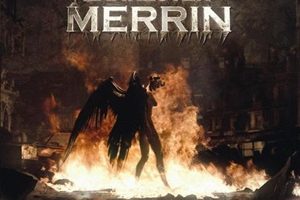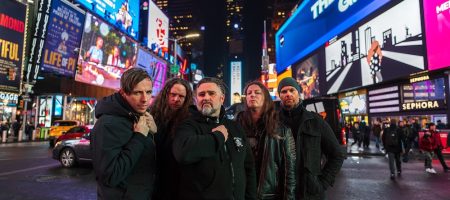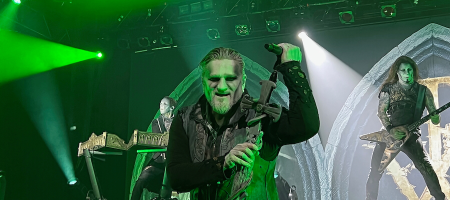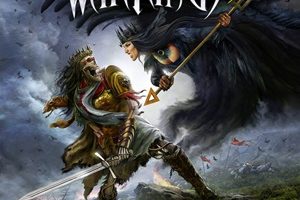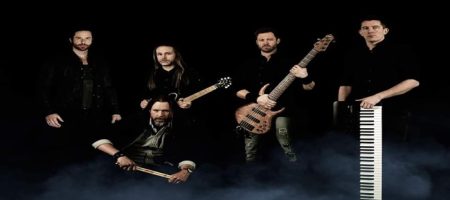Powerwolf – An Infectious Call
Sunday, 27th June 2021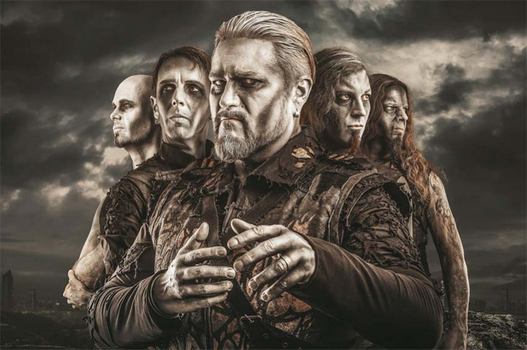
When looking at bands over the last fifteen plus years that have captured solid followings and vaulted up the prestigious international festival lineup programs, especially within the metal realm most would put Powerwolf in that ‘must see/experience’ category. Beyond the striking corpse paint and visual / theatrical elements, their music and songs have this addictive power/heavy metal quality where unison audience chanting and singalongs often rival the volume of the music. Call of the Wild, out on Napalm Records, is the quintet’s eighth studio record – a tightly written and executed endeavor that includes the normal orchestration, choir, and organ aspects beyond the guitars, drums, and commanding vocals. Yet they also add in bagpipes, another ballad, as well as varied cultural harmonies / atmosphere to ensure deeper listens through and through.
We were able to speak to main songwriter/ guitarist Matthew Greywolf from the European/Napalm Records headquarters and he caught us up on the latest album, the bonus material, the key secret that he believes pushed Powerwolf into the legions of metal fans, special Bloodstock festival memories with a werewolf, and hopeful future touring plans to finally include North American dates.
Dead Rhetoric: Call of the Wild is the eighth studio album for Powerwolf. Did the lack of touring due to the pandemic shutting most of the world down by March of 2020 influence getting down to work for this new record quicker – and how do you see this record slotting in your catalog in terms of what you were aiming to achieve with the songwriting and performances?
Matthew Greywolf: I would say the pandemic didn’t really influence our schedule. We had literally been finishing our touring plans for the previous album in March when the pandemic started to affect everything. We played a show in mid-March in Mexico City, and only a few shows of the South/Latin American tour got cancelled. The remainder of the year we had the songwriting for the new album scheduled. In a way we’ve been in a good luck situation, having finished the touring anyway. Me being the main songwriter, in the beginning of the pandemic I felt a sense of relief because usually I’m the one who has to stop the rest of the band from touring. We need to focus on the album – and this time there was nothing else to do.
I must also say the work on the album was what really kept us busy and positive during the year. I was really grateful that we had scheduled writing an album during last year. I’m really happy we finally could release the album. It was not easy to get through the recording stages but here we are finally with the album.
About the second question where I see this album in the Powerwolf discography. I always feel like the new album is like a new chapter in a book. It’s continuing the story, maybe we put some new side twists in the plot or some new characters, just continuing to tell the story. I think that’s what we’ve done with Call of the Wild. The album is probably the most open-minded one, the most varied one to date.
Dead Rhetoric: Is there were the bagpipes came into play with one of the songs?
Greywolf: It’s one of the examples. I guess five years ago we wouldn’t have gone for this as it would have been too much out of the comfort zone, maybe, too exotic. This time we just felt like, come on – let’s go for it. You mention the bagpipes in the song “Blood for Blood (Faoladh)”, this has a massive Celtic/Irish influence. It was this way, even when we started writing this song, there was no metal instrumentation involved at all. I wrote the song on an acoustic guitar, I heard all the bagpipes, and I wasn’t even sure if it would become a Powerwolf song. I enjoyed myself writing this song. In the past, I would have not even presented this to the band. This time, let’s see what it’s going to sound like once we bring in all the typical trademarks of Powerwolf. That was pretty much the approach for a large part of the album. They have the confidence that things would sound like Powerwolf once everything was in there, the way I write the songs, the church organs, all these trademarks. That’s what finally made the album.
Dead Rhetoric: When it comes to the construction and refining of the songwriting, what challenges come up this deep into the career of Powerwolf? Do you feel sometimes constricted by certain boundaries already established in the formula, or do you believe your fans can accept sometimes that you will stretch as necessary?
Greywolf: I would say the latter. I’ve never felt like being trapped in some kind of narrow concept or formula. Over the years we have developed a trademark sound, we love this kind of sound. We are not the kind of band that feels the need to reinvent the wheel with the next album, so to say. But at the same time, this style has never been a constructed formula. It emerged by the five of us and the way we play music together. It’s a very natural feel. You could compare it to the way you speak, or how you look. You can modify some things, but in the end it’s who you are. That’s the way with the trademark style of Powerwolf. It’s how we sound, I don’t need to force myself to sound like this. It’s the other way around – if I tried to change the main characteristics of our sound, it would feel like an artificial process. I would not feel happy with that.
Dead Rhetoric: Tell us about the cover concept for Call of the Wild – and do you believe the visual elements have always been an important component that ties in everything that Powerwolf delivers as far as your style?
Greywolf: Definitely. When we founded the band, I remember one of the first rehearsals we had the idea that this would become something visual too. Once we had an album out and we could play shows, we would deliver some kind of theatrical performance. Back then, it was theater that was our main inspiration for how to be active on stage. Yes, the visual part has been an integral part to the world of Powerwolf.
Speaking about the artwork of Call of the Wild. What my initial thought about it was to illustrate some sort of movement in the balance between what is supposed to be good and evil. The balance which stands for of course the angels and the demons on the other side, but it’s not meant to display the weight. One of the previous interviews asked me if the angels are heavier than the demons, some sort of message in this. There is constant movement, there is no black and white, there is no good and evil archetype thing. It’s a more complex situation, there’s a constant struggle with the movement. It refers to the album title – this wild kind of movement and struggle.
Dead Rhetoric: Once again you’ve created a special limited edition double CD and triple vinyl offering for the new record. Do you believe this extra work and effort to deliver unique products time and again connects Powerwolf even more to their faithful followers and collectors – especially in a time when streaming and digital music has overtaken physical sales?
Greywolf: That’s a very good question. Honestly there is not much of a marketing thought involved in all of that. Speaking of the third album which is an orchestral version of the album, at least with the last two albums we recorded and developed very detailed and dense orchestrations, and in the final mix of the album we always have to sort out things a bit and thin out orchestration. We consider ourselves a metal band first and foremost, not an over the top symphonic experience. It’s like the orchestration is the spice in the soup so to speak. The main thing will always be a metal song.
Naturally a lot of these orchestral elements then get sorted out, and certain things get lost a little bit. The orchestral albums are a means to play the full range of details that have been crafted during the process. With the bonus album, it was a sort of personal project at first. Sometimes you just stumble into ideas that are initially not meant to be made in a concept. We decided to let befriended singers perform Powerwolf songs, as the idea came up spontaneously. We had been touring South America with Amon Amarth in early 2020. One night after a few beers, we thought about how it would sound if Johan with his awesome vocal style would sing one of our songs? We asked him and he loved the idea. That was probably the birth of this project. Some weeks later we listened to the version he recorded of “Nightside of Siberia”, and we thought we should ask some more singers to contribute to this. That’s how this project emerged, and we have a full bonus album of these versions. These things cannot really be planned, they emerge out of the situation.
Dead Rhetoric: Right – because a couple of albums ago, you recorded an Amon Amarth song “Gods of War Arise” for your own bonus albums…
Greywolf: Correct – and this is where the circle closes a little bit. There has been no masterplan for this.
Dead Rhetoric: What do you believe have been some of the keys to the ultimate success Powerwolf has achieved? Is there something to be said for consistency, teamwork, band chemistry, or are there other factors at play?
Greywolf: I would say the most important basis is friendship. We have always considered ourselves as friends first, and then as a band. That’s something very important. If somebody asked me what’s the most important thing to have in a band, I think you need to have the best musicians who are your best friends. Once you are out on tour a lot, you will experience many days where everything is a little harder. There are good and bad days on tour, you might miss your family. When I am on tour, I feel I am out there with my best friends, which is everything.
If I should cut it down to what is most important in Powerwolf, that’s the main thing. I’m convinced on stage you can see that and feel that – it’s not just some random musicians on stage putting a show together. It’s best friends having the time of their lives. I think that shows through and what people can actually feel. Maybe also it infects the audience.
Dead Rhetoric: Over the years I’m sure you have some interesting fan interaction stories that have occurred. What have been some specific moments that have stood out in this regard?
Greywolf: I remember spontaneously something. I think it was 2019 we played Bloodstock in the UK. There was a guy during a signing session that had this awesome werewolf costume. I thought it was so great that I told him we would give him a backstage pass, and he should come on stage with us. He was so happy to do it. He came to us, and the tour manager had to bring him on stage, and we found out the guy was almost blind. It was very overwhelming for him. Those are interaction moments that I will remember for the rest of my life.
I’m a metal fan and I have been since I was eleven years old. Sometimes during shows you see very young kids in the audience and you remember yourself in those days. You can see the younger you there. Young fans having a great time, it’s incredible to what you feel in this moment. That is real success to me, it’s not about chart positions. It’s about the moment when you can feel and touch someone with what you are doing with your music.
Dead Rhetoric: In other interviews the subject of putting together a Powerwolf special show with a full orchestra has been an idea you want to execute at some point. Do you believe this is something that could happen in the upcoming years, and how do you feel about the meeting of heavy metal and orchestras with acts like Rage, Yngwie Malmsteen, and Metallica to name a few?
Greywolf: Probably, one day this could become real. Never say never. I must say, it’s not actually the biggest dream I have. When this kind of collaboration came up for the first time, and you mentioned Rage being one of the first acts in the 90’s to do that, then Metallica on a large scale, it was super exciting. I also think of the Deep Purple album, the way they did it in the 70’s. In the meantime, I feel like the story is already told about it. It’s nothing super special anymore, and to me it feels like if this will happen one day we will enjoy it, but if it doesn’t happen it’s nothing that’s really on my agenda.
Dead Rhetoric: How do you view the heavy metal landscape across Europe and the world in the current marketplace? What pleases you and what improvements (if any) do you think need to be made?
Greywolf: There is something that actually makes me pretty happy currently. I can see that there (are) lots of young metalheads coming to the shows – 14-15, and they are very dedicated with a good knowledge of the scene. This is something that shows me that the scene is evolving and continuing. Maybe one day the old heroes will not be on stage anymore, but there are so many young bands and young fans, I see there is an evolution. Being a metal fan myself, this makes me really happy. There is fresh blood coming, headlining big festivals that haven’t been around like ten years ago. In Europe, you have Sabaton, Powerwolf, or Volbeat to name a band that’s more rock than metal. There are new headliners coming up and new generations coming to the scene. It gives me a big smile.
Dead Rhetoric: How do you feel about your time with Napalm Records after starting your career on Metal Blade?
Greywolf: I can’t tell you because Lucas (Napalm Records staff) is listening! (laughs) I really feel like… this is our fourth album with Napalm, not counting the live releases. Which says a lot, we have a very trustful cooperation with them. That’s why we are working with them for so many years, and hopefully for lots of years to come.
Dead Rhetoric: What would be surprising to learn about Matthew the person away from Powerwolf when you have downtime away from the music?
Greywolf: That’s a good question as I hardly have the downtime away from music. But there is something that the pandemic brought, during the last year I learned to enjoy nature. I really learned this. As a kid I loved it, and the last year when everything was closed, no possibility to use your time with cinema, etc. I became a big fan of wandering through forests. I intend to extend this even once life is back to normal, I recommend it to everyone. It’s a very good balance to being in a band, touring/recording, it can give you a balanced feel and release. Maybe a side you would not expect from a guy with the corpse paint on the stage.
Dead Rhetoric: How do you see the next year or so as far as touring and promotion for Powerwolf playing out? Any hopes to hit new territories, including shows in North America?
Greywolf: Currently, the first hope of all is the possibility of live shows to come back. Definitely, I know we have said this many years and never made it across the Atlantic, we definitely want to do so. We really hope we can. With the last album Sacrament of Sin, we really extended the touring into a lot of new places, double as many shows as we did for the previous album. We intend to increase the number of shows on a large scale with this album. Let’s hope the pandemic will subside to give us a chance as soon as possible.











